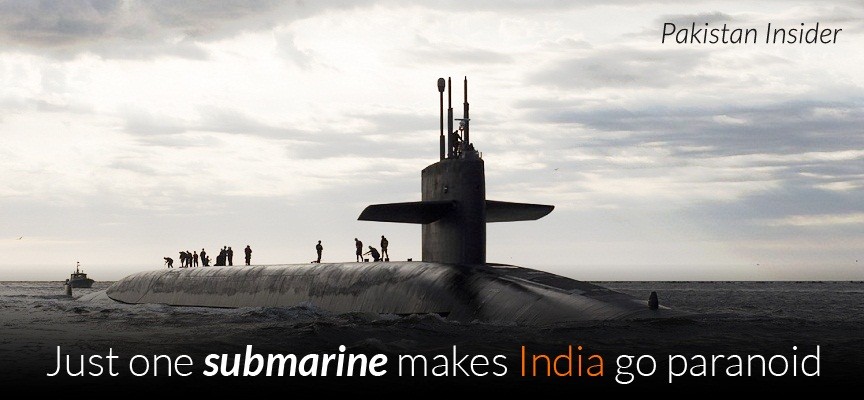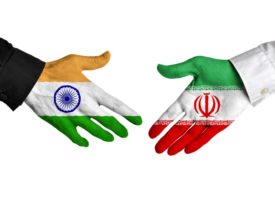Indian media is known to regularly incline towards sensationalism, even at the expense of covering more important issues. Electronic media in India, unlike the comparatively independent and serious print media, often reflects a strong pro-establishment narrative. This is the reason why red tickers and flashes on “Breaking News” seem to take the very pulse out of an ordinary viewer who would perhaps be more concerned with domestic sanitation, healthcare, human security and economic issues than what two other countries are doing.
On June 27, 2015, India Today aired another piece of sensationalist content on primetime TV which was later reproduced as a report in the group’s website. The report talks about a purported Chinese submarine “secretly” docking in Karachi while passing through the Arabian Sea. The average Indian viewer/reader, of course, was immediately mortar-fired with the usual “The-Chinese-and-Pakistanis-are-upto-no-good!” rhetoric. Some of the notable statements made in the online post along with my personal comments in bold are as follows:
• The opening line begins as such, “In the already turbulent conditions over the Arabian Sea, this is by far the most alarming incident in recent years.”
Comment: How is the visit of a Chinese submarine “the most alarming” in recent years? Without going back much further, it was reported in November 2014 that India was “concerned” about the docking of Chinese submarines (not one but two) in Sri Lanka for several days. There were two submarines in that incident, whereas this recently purported incident involved just one submarine. Why give it a more alarming status?
• “According to exclusive details available with India Today, China’s Yuan Class 335 submarine crossed the Arabian Sea and entered Karachi port on May 22.”
Comment: The fact that this incident purportedly took place more than a month ago and has just been “shared” with Indian media raises certain questions; the reporters most definitely were given insider information by sources within the Indian Navy. The most important question is, why did the Indian media share this news at this particular point in time? In an already tense situation prevailing between New Delhi and Islamabad, what is the purpose of further eroding Confidence-Building Measures (CBMs)? For a security analyst, this isn’t much of a breaking news since such visits are held in routine between and among various nation states from time to time.
• “The submarine with at least 65 crew members reportedly spent at least a week in Karachi refuelling and restocking before sailing back to China.”
Comment: The estimated number of personnel reported raises the following questions: India Today is not a foreign military observer website or defence analysis forum, what interest do its ordinary news readers have with knowing the number of Chinese navy personnel? Furthermore, don’t other countries dock their submarines in other countries for goodwill visits? Or is there bound to be something sinister between Pakistan and China? Let me share some prominent examples: USS Hawaii, a US submarine had docked in Subic Bay, Philippines in September 2012 on a goodwill visit. Similarly in December 2012, a Dutch submarine HNLMS Bruinvis docked in Canary Wharf, London for a goodwill visit. Was there a hidden agenda behind their visits too?
• “The incident took place less than a week after Prime Minister Narendra Modi’s wrapped up Beijing trip.”
Comment: This statement, based on purported source reports, does not warrant publication. After all, this particular inference only raises further doubts in Indian people’s hearts and minds; the existing confidence gap between Beijing and New Delhi gets a severe blow by such unfounded inferences. Is the media group suggesting the Chinese are playing double-games in dealing with India? Are there certain hawks in the Indian military/security establishment who cannot withstand the warming of Indo-China ties? Why should Beijing even take New Delhi’s diplomacy seriously when one of its largest media groups comes out with such irresponsible inferences based on hearsay source reports?
• The article reveals a brief timeline of what it believes to be the submarine’s journey. It then asserts, “Beijing’s first-ever deployment of a submarine to Pakistan signals a new cat-and-mouse game in the region”.
Comment: What does the report mean by ‘cat-and-mouse’ game? Is India perhaps ignoring the fact that China is focusing on regional economic development, Pakistan is busy tackling its own internal security woes? Has the media group conveniently forgotten mentioning it is in fact India, with its tri-service Andaman & Nicobar Command (theatre-level command) which is the actual sign of belligerence? In fact, during the Carnegie International Nuclear Policy Conference 2015, Lt Gen (retd) Khalid Kidwai, the pioneer and longest-serving Director General of Pakistan’s Strategic Plans Division and current adviser to National Command Authority spoke about the reason for developing the Shaheen-III missile with a 2,750 km range. He remarked it is covers the tip of Andaman & Nicobar island because recent reports have shown India is developing them into “strategic bases”. One report claimed India intends on using these islands as a “strategic deterrent”, most apparently against China and, in all possibility, Pakistan.
• The report then comes to the actual point around which this whole “alarm” was set: “It must be noted that China will be selling some eight Yuan class submarines to Pakistan within the next few years.”
Comment: On April 2, 2015, the Wall Street Journal published a report titled “Pakistan to Buy Eight Chinese Submarines”. Quoting several named and unnamed sources, there was some speculation that China will be selling the Yuan class attack submarines (Type 039A or Type 041) to Pakistan; however, without confirming the exact make, the report further claimed there could be a possibility that Pakistan will instead procure the Qing class (Type 032) submarines. For the sake of argument, let’s assume Pakistan will indeed buy the Yuan class submarines; does this still justify the unnecessary hue and cry? Doesn’t every country procure defence equipment to satisfy its national security requirements?
• “On May 28, Navy chief Admiral RK Dhowan told reporters in New Delhi that India was “minutely” monitoring Chinese naval activity in the Indian Ocean. He signalled the start of a new great game over the world’s most important water body.”
Comment: Judging from the content in this report, it seems perhaps the Indian Navy chief’s (senior-most) office is itself leaking reports to the Indian press to cause a commotion and indirectly ring alarms in New Delhi and the Cabinet Committee on Security. These are also oft-employed mechanisms to lay grounds for demanding more funds from the establishment. India believes the Indian Ocean is “of India” literally by virtue of its name. This hegemonic mindset will not end anytime soon and with the advent of US Pacific forces in the coming times, the “world’s most important water body” will likely face a “new great game”; however, it will be triggered by an aggressive India, dreaming to be a regional superpower, and its sponsor, the US Pacific Command.
• The report ends with an absolutely irrelevant quotation of Council of Foreign Relations which talked of Pakistan’s growing nuclear arsenal. Is the report hurriedly trying to leave the impression that these submarines, which employ torpedoes and not missiles, will give Pakistan the sea-based second strike capability it has long sought? It is an indirect signalling towards the existence of Pakistan’s Naval Strategic Force Command (NSFC). If this is why the ending paragraph was drafted, it is an absurdist allegation. Ankit Panda, a renowned analyst at The Diplomat, rightly noted in his article dated March 15, 2015: “Even if Pakistan manages to operate submarines on par with China’s Type 032 Qing-class or Type 041 Yuan-class, capable of launching longer-range land attack cruise missiles (a max range of 1,500 km), these missiles are only capable of being armed with “unitary tactical nuclear warheads,” according to globalsecurity.org – a far cry from the strategic nuclear deterrent necessary to credibly field a second strike capability. Experts note that Pakistan will need a submarine fleet comprising 14 vessels in order to keep one nuclear-armed sub on stand-by at all times.”
On a side note, the same media group (India Today) published a similarly sensationalist story in December 2014 titled “China’s submarine noose around India”. A notable excerpt in this report claimed: “Naval intelligence officials who correctly predicted that China would use anti-piracy patrols as a pretext for deployments in the Indian Ocean feel vindicated. Their prognosis of this game of ‘weiqi’-a game of Chinese chess which uses encirclement, is gloomy. “A full-scale Chinese deployment in the Indian Ocean is inevitable,” an admiral told India Today.”
I believe my assumption to be correct: some enthusiastic hawks in the Indian Navy chief’s office are directly sharing reports with this media group for some frenzy. After all, the more Indian armed forces ring alarm bells of “dangers in the neighborhood”, the more funding they will get.
Also, in a post for Indian website FirstPost dated June 29, 2015, author Rajeev Sharma went to the extent of giving his premier Modi a suggestion in context of the above-mentioned news. He wrote: “What is required of PM Modi is that he needs to do away with the red tape and expedite beefing up India’s submarine strength. This is a worrisome scenario. PM Modi needs to think out of the box. Ten days later he will be off to Russia for attending BRICS summit. The submarine issue should figure high on the talking points when he holds one-to-one talks with Russian president Vladimir Putin.”
Conclusion
Merriam-Webster dictionary defines “paranoia” in the following three variations:
1. an unreasonable feeling that people are trying to harm you, do not like you, etc
2. a tendency on the part of an individual or group toward excessive or irrational suspiciousness and distrustfulness of others
3. a serious mental illness that causes you to falsely believe that other people are trying to harm you
From a neutral perspective, all three of the above-listed definitions fit perfectly well on the Indian media.








No comments!
There are no comments yet, but you can be first to comment this article.